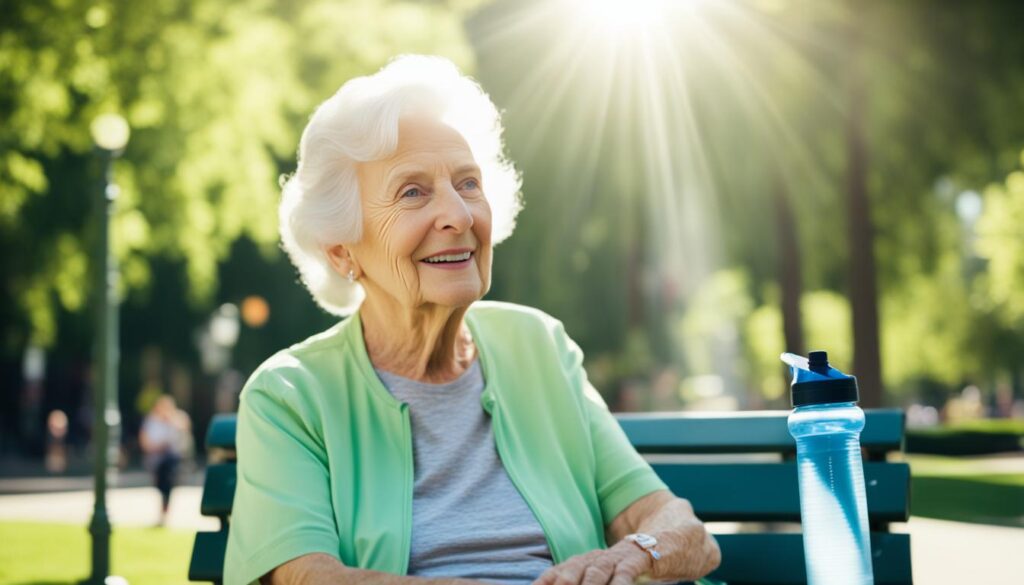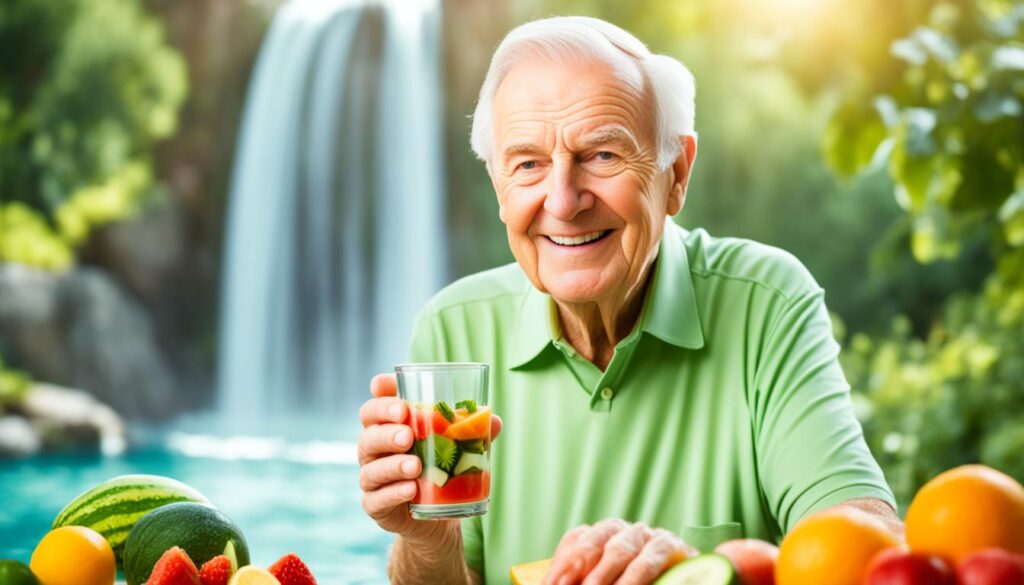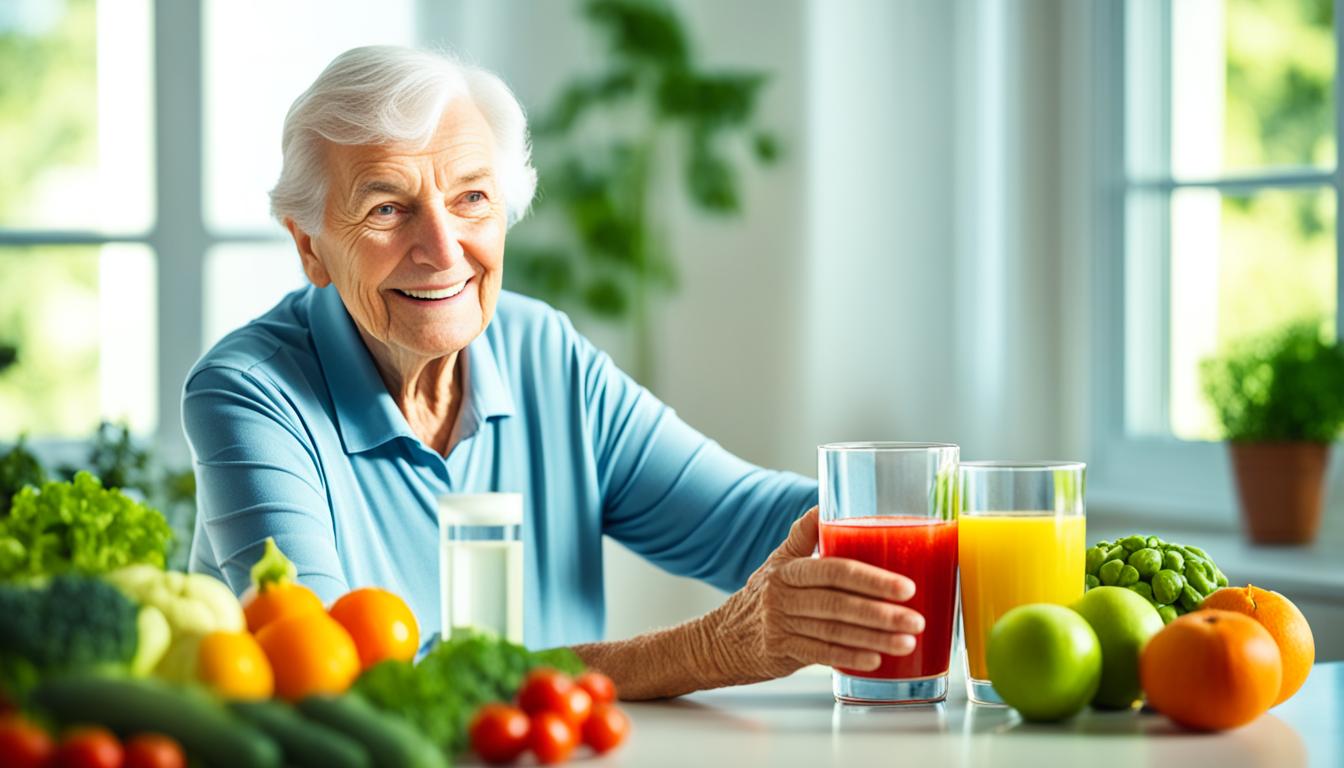Keeping hydration for seniors in check is crucial for their health and energy. As people get older, it’s harder for them to feel thirsty, which increases the risk of dehydration. Learning and following senior hydration tips can make a big difference in their life. This includes more than drinking water—it means making sure they drink regularly and properly.
It’s vital for caregivers and seniors to know how to spot dehydration and improve water intake. Here, we’ll share how to make hydration a part of daily life for seniors. This way, they can stay healthy and enjoy their later years to the fullest.
The Vital Role of Hydration in Senior Health
Hydration is key for older adults, and not just about drinking water. It’s vital for digestion, absorbing nutrients, and removing waste. As we age, our body holds less water. This makes hydration in elderly crucial for health and well-being.
Inadequate hydration impacts seniors both physically and mentally. It affects joints, body temperature, and muscle function. Not drinking enough can lead to memory problems, focus issues, more tiredness, and a higher chance of falling. This can greatly affect the quality of life in later years.
With aging, thirst becomes less noticeable and kidneys don’t work as well. So, it’s important to keep track of how much water seniors drink. Below is a table showing how proper hydration helps:
| Hydration Factor | Health Ramification |
|---|---|
| Joint lubrication | Reduces joint pain and improves mobility |
| Temperature regulation | Prevents heatstroke and maintains normal body functioning |
| Muscle function | Decreases muscle cramps and maintains strength |
| Cognitive performance | Enhances memory, concentration, and alertness levels |
| Prevention of falls | Improves balance and coordination, reducing injury risks |
It’s important to understand how crucial water is for seniors. Caregivers, family, and doctors need to focus on hydration. By doing this, we can support the well-being of the elderly. Hydration is a key part of keeping older people healthy.
Recognizing the Signs of Dehydration in Older Adults
Dehydration is a serious issue in seniors that’s often missed. It’s key to watch for signs of dehydration in older adults for their health. Spotting these signs early lets caregivers use senior-friendly hydration strategies to dodge dehydration’s bad effects on senior health.
Physical Indications of Dehydration
The body shows many signs when it’s dehydrated. These include feeling very tired, having a dry mouth, and feeling dizzy because of low blood pressure. These symptoms mean seniors need close watching for other signs like confusion or not peeing much. This can also mean the pee is dark yellow and smells strong. Catching these signs is key for strategies to encourage fluid intake.

Cognitive Effects Related to Inadequate Hydration
Dehydration affects the mind too, not just the body. Not drinking enough can lead to forgetting things, not being able to focus well, and being slow to react. These issues are even bigger for seniors with dementia. This makes regular drinking habits even more important.
| Signs of Dehydration | Senior Health Implications | Strategies for Prevention |
|---|---|---|
| Dry mouth, fatigue, dizziness | Increased fall risk, UTIs, kidney stones | Timed fluid intake schedules |
| Disorientation, dark urine, infrequent urination | Electrolyte imbalance, cognitive decline | Accessible water delivery systems |
| Memory issues, poor concentration | Aggravation of dementia, mood shifts | Engaging in hydration reminders |
Using strategies to encourage fluid intake and senior-friendly hydration strategies helps a lot. Knowing the issue and acting early lets us protect and boost seniors’ health and life quality.
Understanding the Causes of Dehydration Among the Elderly
Dehydration poses a big health risk for seniors, often due to many different factors. Understanding why older people are more likely to not drink enough is important.
Age is a major factor. As we get older, our bodies hold less water. Plus, seniors might not feel thirsty until they’re already dehydrated. So, it’s important to drink water regularly, even if you’re not thirsty.
Changes in Body Composition and Thirst Perception
As people age, they lose muscle and gain fat, which means less water in the body. Also, the older we get, the less we might feel thirsty. This makes it crucial to stay on top of drinking water.
Medications and Health Conditions Impacting Hydration
Medications can cause dehydration in seniors. Pills like diuretics lead to more bathroom trips and can dry you out. Also, if it’s hard to move around, getting water can be tough, adding to the dehydration risk.
Dehydration isn’t just about physical issues. Mental health, like being depressed, can make people care less about staying hydrated. So, it’s important to look after both the body and mind to prevent dehydration.
Keeping seniors hydrated requires understanding the challenges they face, such as changes in their body, medications, and health conditions. By creating plans that consider these issues, caregivers can help seniors stay hydrated and healthy.
Hydration for Seniors: Strategies for Adequate Fluid Intake
Getting seniors to drink enough water is crucial for their health. As people get older, they might not feel as thirsty, but they still need plenty of fluids. Caregivers can play a big role in helping them drink more.
One great tip is to keep water within easy reach. A reusable water bottle is perfect for this. This encourages seniors to take sips all day, helping to avoid dehydration.
Linking drinking water with daily tasks can help too. For example, drinking a glass of water when taking medicine can remind seniors to hydrate. Adding foods like fruits and soups to their diet can also up their fluid intake.
By instilling simple habits, such as choosing water over other beverages during meals and embracing hydrating snacks, seniors can easily and enjoyably meet their hydration needs.

- Encourage the use of a personal water bottle
- Associate drinking water with daily activities like taking medication
- Incorporate hydrating options into snacks and meals
- Opt for moist foods that naturally contain high levels of water
- Promote frequent small sips rather than overwhelming amounts
Staying hydrated is vital for seniors’ health and well-being. It can keep them independent and prevent health problems. With thoughtful strategies, we can make sure the elderly stay hydrated and healthy.
Senior-Friendly Hydration: Best Practices and Beverages
For older adults, hydration is key but involves more than just water. It’s important to include hydrating foods for seniors and the best drinks for elderly hydration in their diet. This helps maintain their health and ensures they get enough fluids every day.
Incorporating Hydrating Foods into the Diet
Eating certain foods can also help seniors stay hydrated. There are many tasty options that boost hydration. For example, foods like yogurt and gelatin are not only nutritious but also full of water. This helps seniors meet their fluid requirements.
Pureed fruits are also great for hydration. They’re appealing because of their taste and how easy they are to eat. This makes drinking and eating a fun way to stay hydrated.
Choosing Appropriate Drinks to Ensure Proper Hydration
Varying the drinks seniors consume can encourage them to hydrate more often. Milk and its alternatives are some of the best drinks for elderly hydration. They also provide important vitamins and minerals. Certain fruit juices can also help meet fluid needs while adding nutrients.
It’s suggested that seniors reduce their intake of caffeinated and alcoholic drinks. These can lead to more fluid loss. A good choice is infusing water with fresh fruit for a unique flavor. Or they can try juice and water mixes that are low in sugar. These options make drinking more enjoyable and healthy for seniors.
Addressing the Challenges: Ways to Encourage Seniors to Drink More Water
Keeping seniors hydrated is key for their health. But, there are obstacles. Making water easily available is essential. It ensures they drink enough daily. Our goal is to help seniors get into the habit of staying hydrated. This supports their quality of life.
Creating a Hydration Schedule
Using a hydration schedule is a top method. It helps caregivers remind seniors to drink regularly. With this plan, they don’t get overwhelmed. And they drink enough water, even if they’re not thirsty.
Solving Mobility and Accessibility Issues
Physical challenges can make hydration tough for seniors. Thus, solving these problems is crucial. By using cups with easy-grip handles and straws, drinking becomes simpler. Also, keeping water within easy reach is important. This lets seniors stay hydrated on their own, even with limited movement.
Conclusion
Maintaining senior-friendly hydration strategies is key for health during the golden years. As people age, the body changes, making it hard to stay hydrated. Adequate hydration supports all parts of body function, playing a big role in preventive care for seniors.
Teaching about senior hydration tips and dehydration signs helps older adults and caregivers act early. It’s up to families, doctors, and caregivers to ensure seniors know and can stay hydrated. Staying hydrated isn’t just good self-care, it’s essential for a better life and longer living for older people.
Overall, senior health relies on good hydration habits. It’s about meeting each person’s needs, drinking regularly, and picking the right drinks and foods. Let’s support great hydration to keep our older community members healthy.




